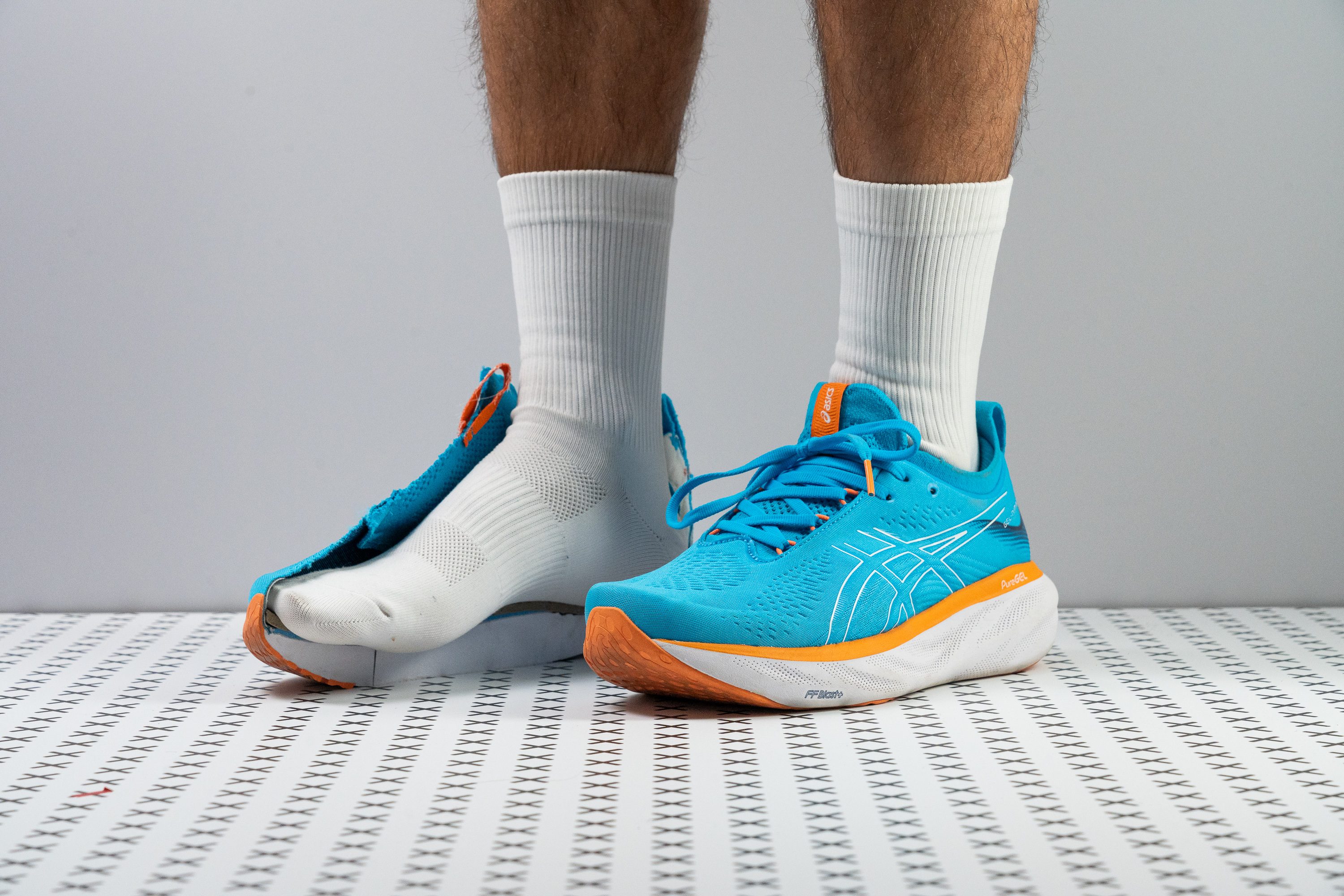Our verdict
- Top pick in best cushioned running shoes (2023)
- Top pick in best running shoes for orthotics (2023)
Pros
- Sweet marshmallowy ride
- Feels surprisingly stable underfoot
- Great at gobbling up miles
- Generously padded and extremely comfortable
- Snug performance-style fit
- No break-in period needed
- Sleek and sustainable design
- Good traction
Cons
- Lackluster breathability
- Not for wide feet
- Not responsive enough for high speeds
- Budget buster
Audience verdict
- Top 28% in road running shoes
- Top 27% in neutral running shoes
- Top 17% most popular running shoes
Comparison
The most similar running shoes compared
+ + Add a shoe | |||||
|---|---|---|---|---|---|
| Audience score | 89 Great! | 92 Superb! | 90 Superb! | 85 Good! | |
| Price | $160 | $150 | $200 | $170 | |
| Pace | Daily running | Daily runningTempo | Daily runningTempo | Daily running | |
| Shock absorption | High | High | Moderate | High | |
| Energy return | Low | Moderate | High | Low | |
| Traction | High | High | High | High | |
| Arch support | Neutral | Neutral | Neutral | Neutral | |
| Weight lab Weight brand | 10.2 oz / 289g 10.5 oz / 299g | 9 oz / 254g 9 oz / 255g | 8.9 oz / 252g 8.8 oz / 250g | 9.8 oz / 278g 10 oz / 283g | |
| Drop lab Drop brand | 7.8 mm 8.0 mm | 7.4 mm 8.0 mm | 8.2 mm 8.0 mm | 5.2 mm 8.0 mm | |
| Strike pattern | Mid/forefoot | Mid/forefoot | HeelMid/forefoot | Mid/forefoot | |
| Size | True to size | True to size | True to size | - | |
| Midsole softness | Soft | Soft | Soft | Soft | |
| Difference in midsole softness in cold | Normal | Big | Small | Small | |
| Toebox durability | - | Bad | Good | Decent | |
| Heel padding durability | - | Decent | Good | Decent | |
| Outsole durability | - | Good | Good | Good | |
| Breathability | Moderate | Moderate | Breathable | Moderate | |
| Width / fit | Narrow | Medium | Medium | Medium | |
| Toebox width | - | Medium | Medium | Medium | |
| Stiffness | Moderate | Moderate | Stiff | Stiff | |
| Torsional rigidity | Stiff | Stiff | Stiff | Stiff | |
| Heel counter stiffness | Moderate | Moderate | Moderate | Stiff | |
| Rocker | ✓ | ✓ | ✓ | ✓ | |
| Heel lab Heel brand | 38.0 mm 41.5 mm | 40.9 mm 41.5 mm | 42.8 mm 45.0 mm | 39.5 mm 43.5 mm | |
| Forefoot lab Forefoot brand | 30.2 mm 33.5 mm | 33.5 mm 33.5 mm | 34.6 mm 37.0 mm | 34.3 mm 35.5 mm | |
| Widths available | NormalWideX-Wide | NormalWide | NormalWide | NormalWideX-Wide | |
| Orthotic friendly | ✓ | ✓ | ✓ | ✓ | |
| Season | All seasons | All seasons | SummerAll seasons | All seasons | |
| Removable insole | ✓ | ✓ | ✓ | ✓ | |
| Ranking | #178 Top 26% | #16 Top 5% | #79 Top 21% | #200 Bottom 48% | |
| Popularity | #110 Top 17% | #7 Top 2% | #25 Top 7% | #68 Top 18% |
Who should buy
The Gel Nimbus 25 is a great choice for:
- Runners who enjoy a plush and bouncy ride from their daily trainers.
- Fans of long distance running who want a well-cushioned shoe to comfortably melt the mile markers aways with
- Runners looking for a maximalist daily trainer that still feels stable underfoot
- Mild pronators who don’t want a dedicated stability shoe
- Casual runners in the market for a comfortable shoe that’s also stylish enough for walks around town
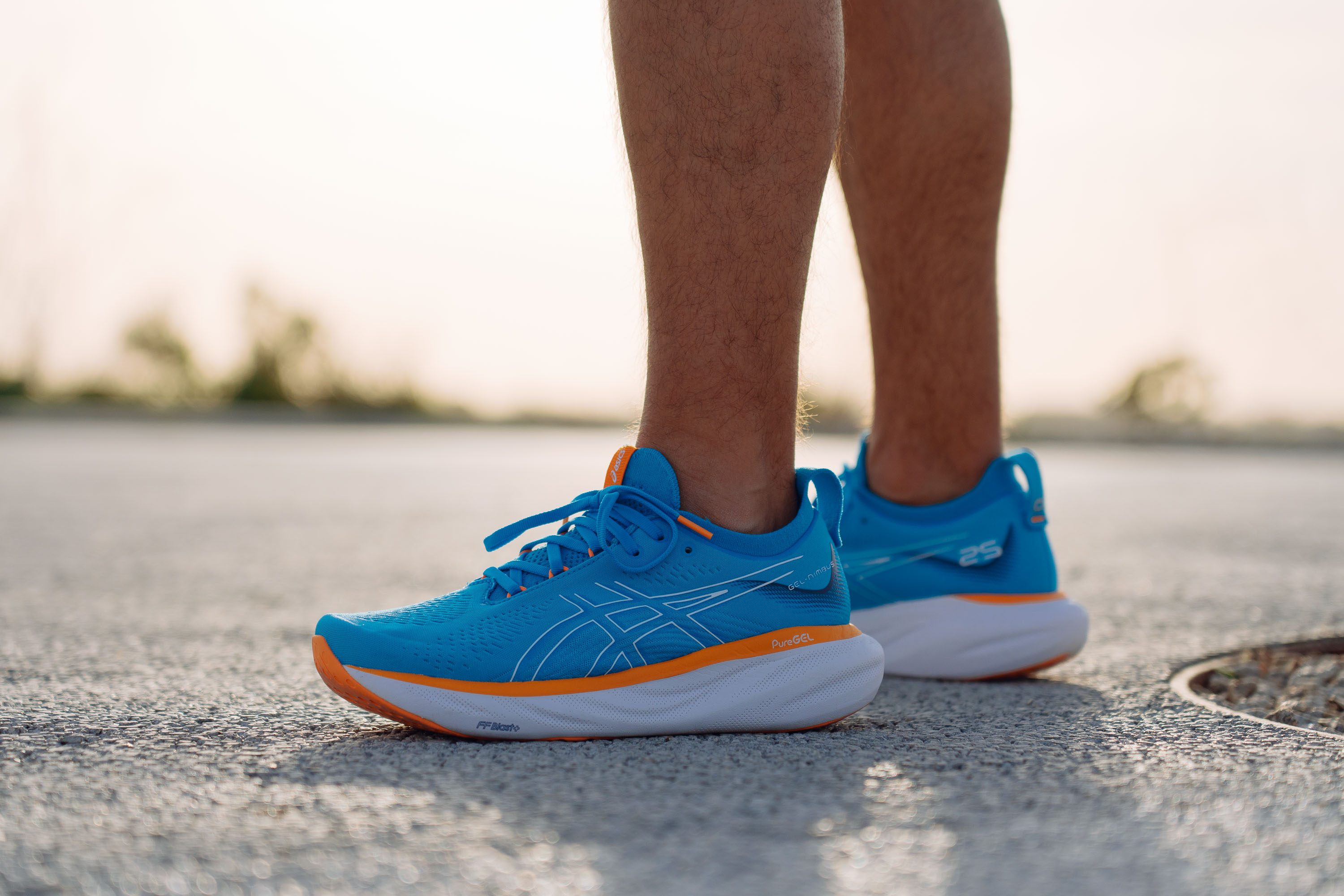
Who should NOT buy
Our feet sank into the Gel Nimbus 25’s pillowy midsole too much for it to be an effective tempo-training partner. For a daily trainer that can pick up the pace while still feeling plush underfoot, we recommend the Brooks Ghost 15 or the plated Hoka Mach X instead.
We were disappointed by the Gel Nimbus 25’s performance in our breathability test. The shoe just doesn’t provide enough airflow to keep our feet ventilated during our test runs, with the Gel Nimbus 25 becoming a virtual sweat-bucket by the end of runs on muggy summer days. For a shoe that melts miles and not feet, we recommend the similarly maximal Saucony Triumph 21.
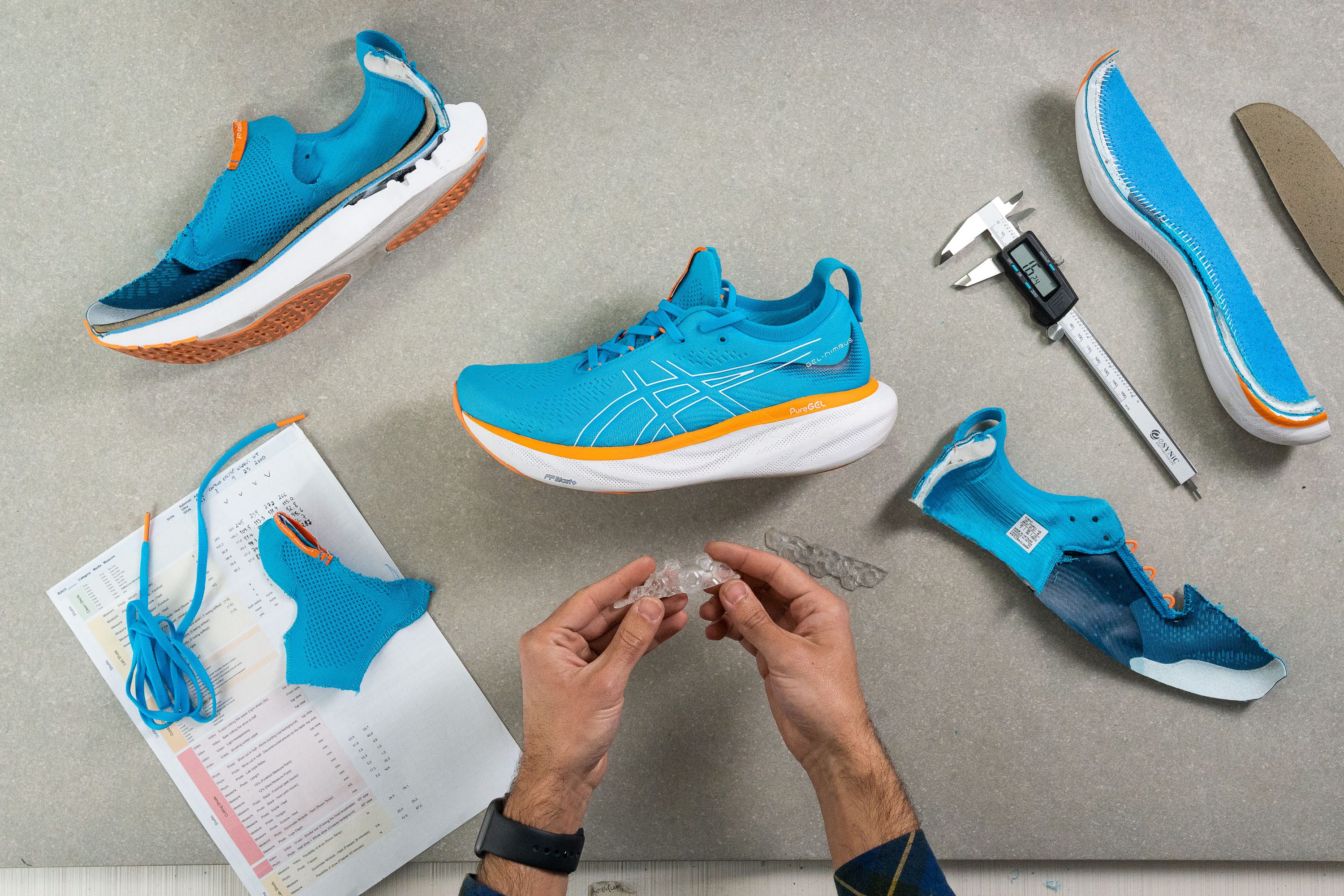
Despite being named after what is essentially a storm cloud, the Gel Nimbus 25 clearly isn’t built to withstand extreme weather. Apart from the less-than-stellar breathability we just mentioned, our freezer tests reveal that the shoe’s midsole softness and overall flexibility are more negatively impacted by the cold than the average road shoe. For runners living in colder climates, we recommend the Brooks Levitate 6 which, as our tests demonstrate, is virtually unaffected by the cold.
Cushioning
Shock absorption
The Nimbus 25 received a complete design overhaul with a new maximalist midsole, naturally boosting its shock absorption. We measured 133 SA in the heel and 118 SA in the forefoot—both values providing plenty of protection for runners of all sizes and levels.
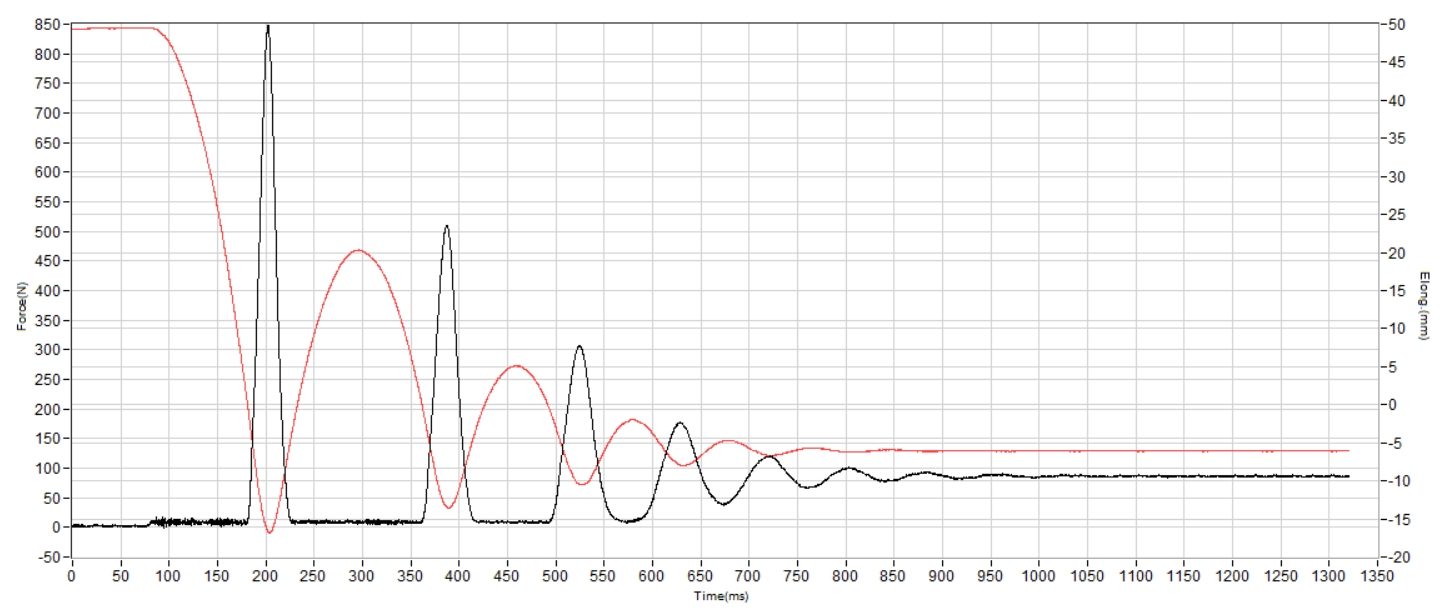
| Gel Nimbus 25 | 133 SA |
| Average | 130 SA |
Energy return
Unfortunately, we found underwhelming energy return in the Nimbus 25, nowhere near what the premium price suggests. It didn’t even hit 50% in the heel, landing at just 47.5%, which clearly leaves plenty of room for improvement.
| Gel Nimbus 25 | 47.5% |
| Average | 58.6% |
Heel stack
The Gel Nimbus 25’s stated heel stack of 41.5 mm provided by ASICS puts the shoe beyond the maximum allowable specifications set by World Athletics for competition. However, using our caliper to measure the stack at the point set by that same commission, we found the stack to only be 38 mm high and still within competing range.
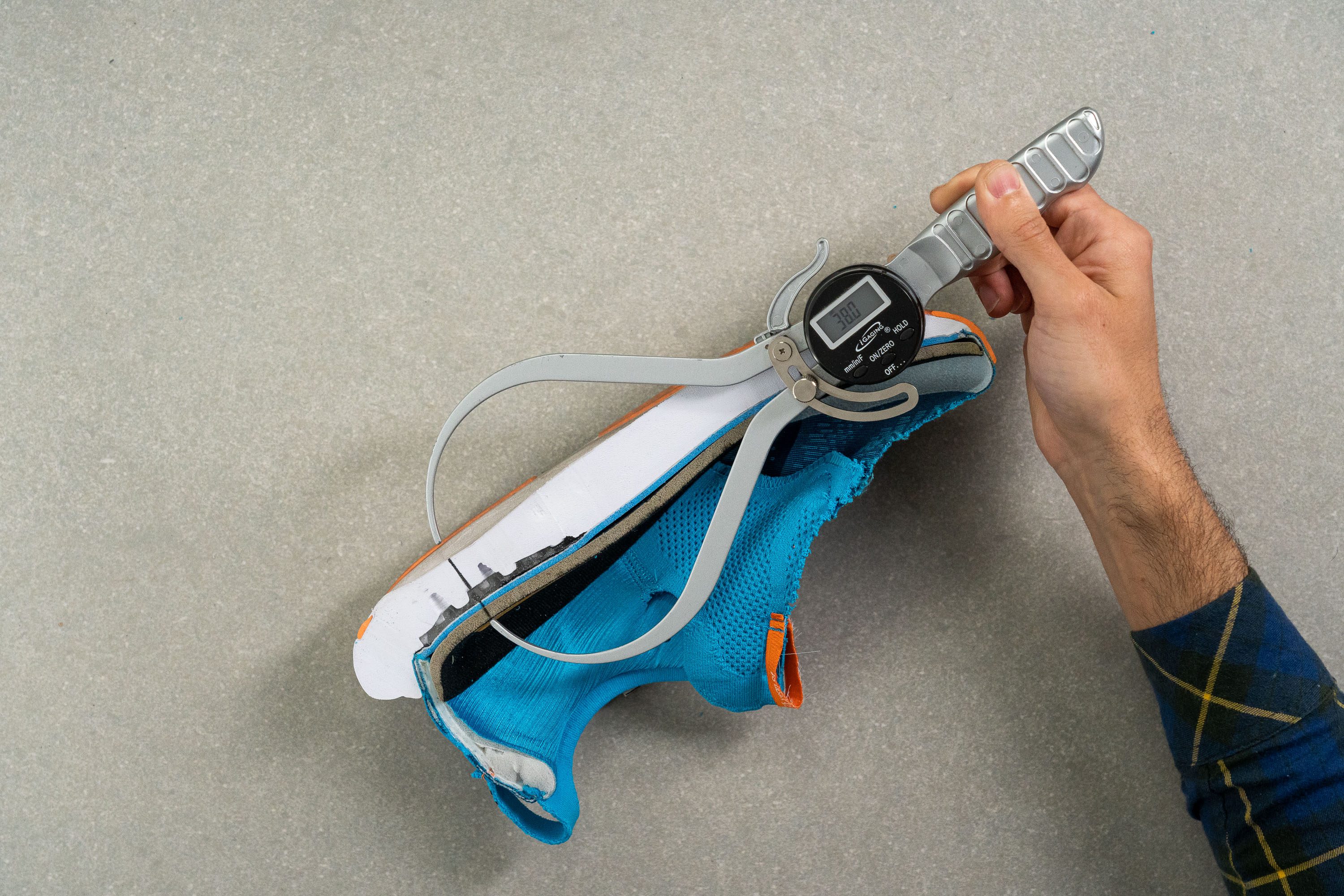
Nonetheless the Gel Nimbus 25 isn’t a shoe that’s geared for racing, which makes this huge stack that dwarfs that of the average road shoe purely pleasure over performance. This amount of foam underfoot means that heel strikers can really sink into and savor the midsole cushioning during their daily runs.
| Gel Nimbus 25 | 38.0 mm |
| Average | 34.8 mm |
Forefoot stack
The shoe’s forefoot stack is also significantly taller than our current lab average, with 30.2 mm of foam underfoot. This is also slightly lower than the spec height of 33.5 mm as advertised by ASICS, a strange fact considering we also include the insole in our measurements.
As a result, forefoot strikers also have plenty of protective foam underfoot to ensure well-dampened landings even during long haul efforts.
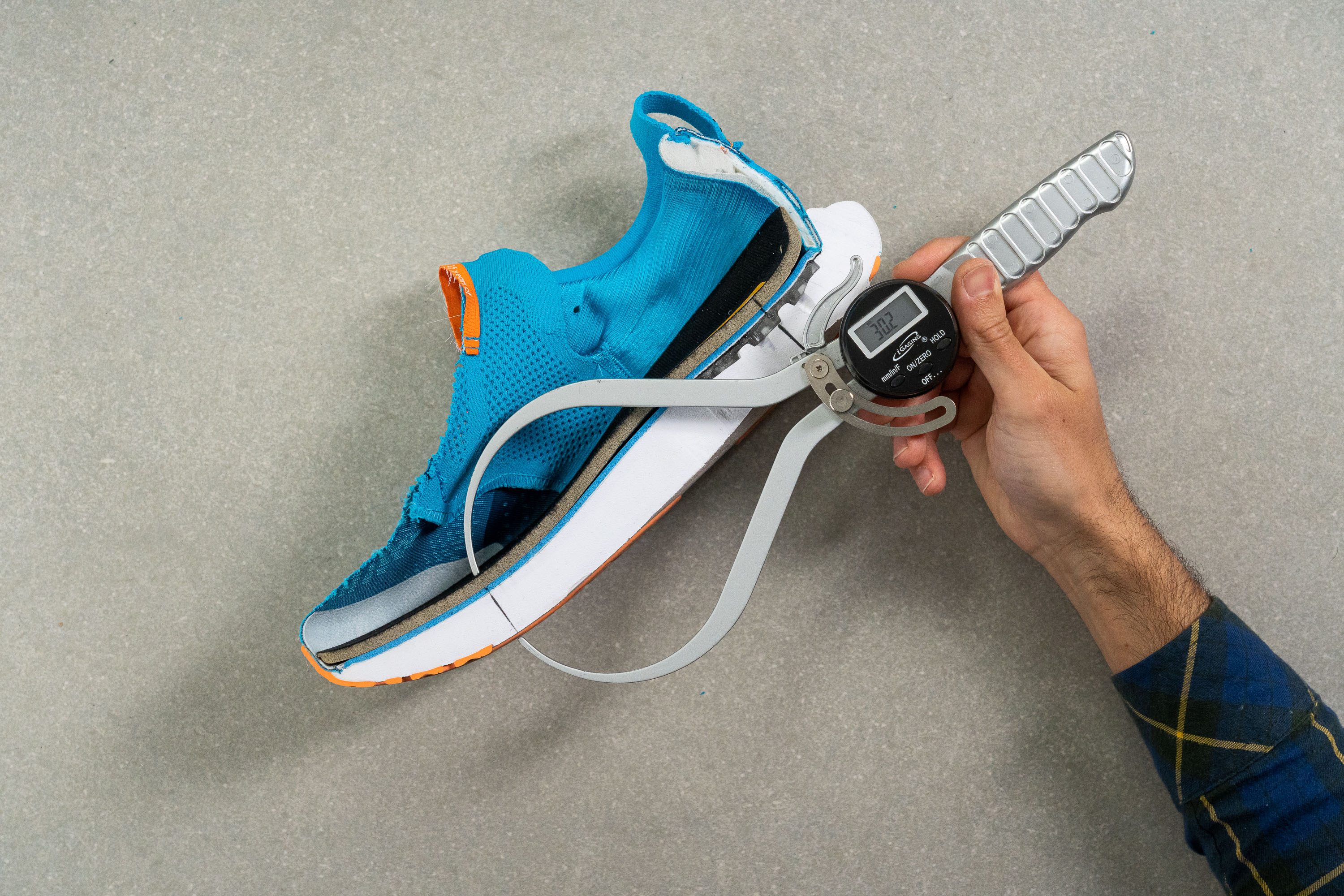
| Gel Nimbus 25 | 30.2 mm |
| Average | 26.2 mm |
Drop
Despite the disparities we found in the shoe’s stack heights, the stated drop of 8 mm remains pretty accurate as the difference in our measurements leave the Gel Nimbus 25 with an accurate offset of 7.8 mm. This mid-level drop is quite versatile and will suit the needs of runners of all experience levels and running styles.
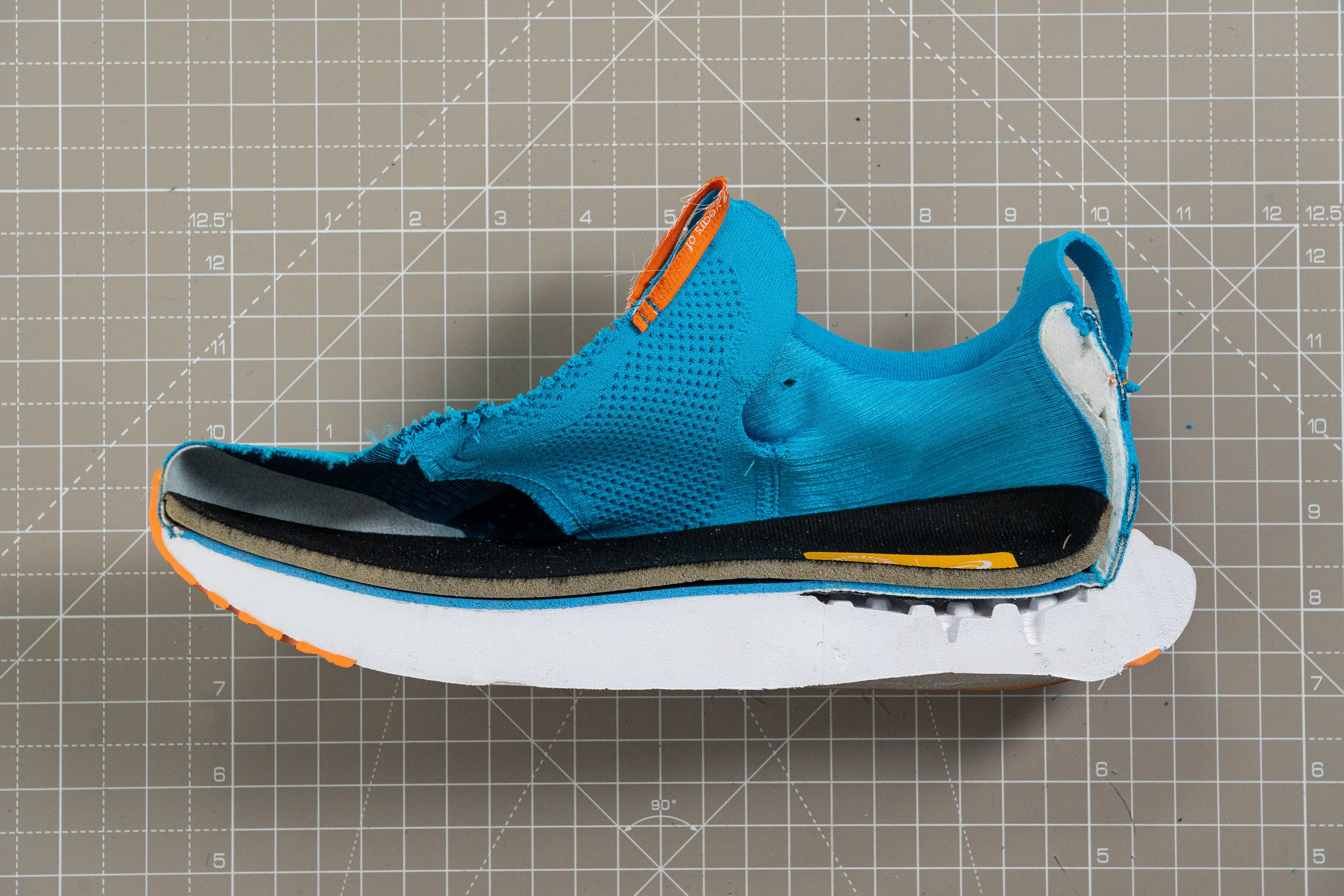
| Gel Nimbus 25 | 7.8 mm |
| Average | 8.6 mm |
Midsole softness
We pressed our durometer against the Gel Nimbus 25’s midsole to measure how soft it is. With a reading of only 18.6 HA, the Gel Nimbus 25’s midsole is decidedly plush compared to our current lab average. This in combination with the tremendous stack really heightens our sense of perceived cushioning, making the shoe feel extremely comfortable and protective over any distance.
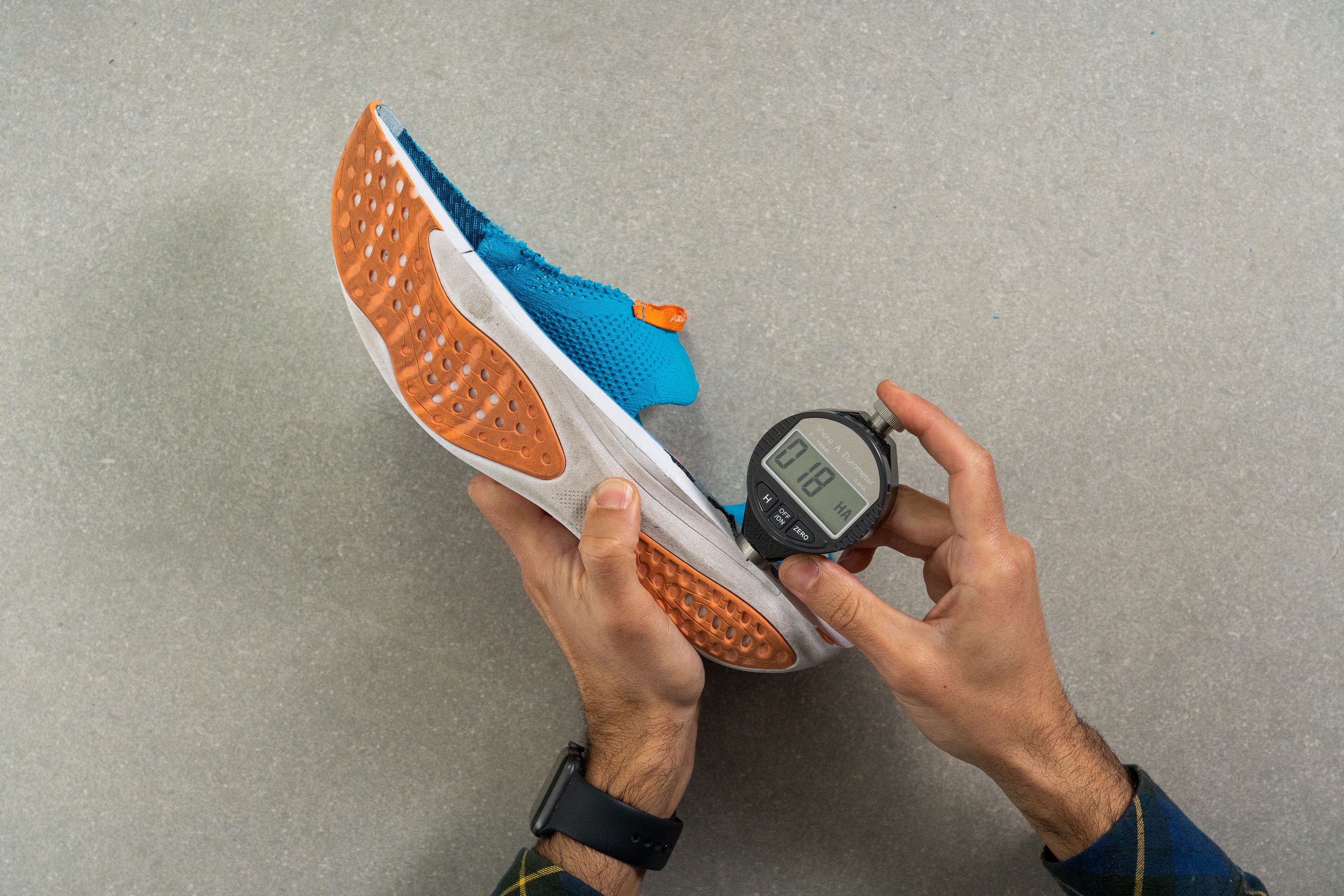
The midsole isn’t overly gummy either. While there is some sinking into the foam as we land, the midsole has a bouncy rebound which provides us with a good level of energy return that is adequate for most daily runs.
At the same time, the Gel Nimbus is a little too soft to provide that explosive pop that facilitates speedy sessions or helps smash PBs. The Hoka Mach X fits that bill better with its Pebax plate providing a level of responsiveness that offsets its plush dual-density midsole.
| Gel Nimbus 25 | 18.6 HA |
| Average | 20.4 HA |
Size and fit
Size
ASICS Gel Nimbus 25 fits true to size (189 votes).
Toebox width - widest part
Using our caliper to measure the Gel Nimbus 25 at its widest point, we found it to be narrower than average at 95.6 mm wide. This is quite a snug fit and puts the Gel Nimbus 25 more reminiscent of tight performance shoes than the generous roominess we want from a daily trainer. On the other hand, the combination of a tight toebox and a wide midsole further factors into the Gel Nimbus 25’s stable underfoot sensation as it effectively locks the foot to the shoe’s robust base
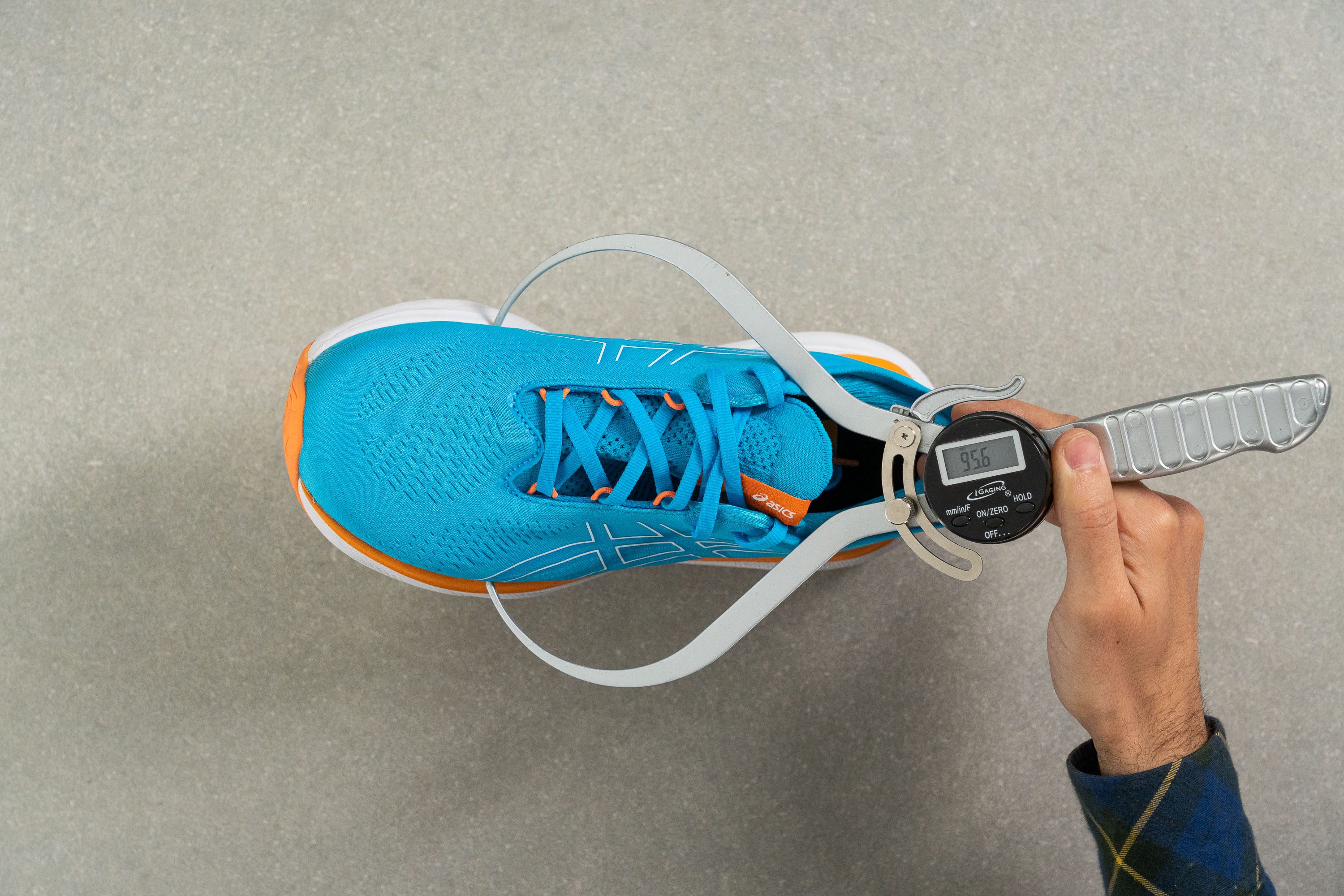
However, with the shoe running a little shoe for its size (260.4 mm vs the average of 265.3 mm for a men’s size 9), runners with wide feet should look into sizing up before abandoning hope on this shoe.
Failing that, we recommend checking out the also well-cushioned Saucony Triumph 21 with its amply spacious toebox.
This test follows an older methodology, which is why you don't see recently tested shoes in the chart. Results from different methodologies can not be compared.
| Gel Nimbus 25 | 95.6 mm |
| Average | 98.5 mm |
Traction / Grip
Traction test
We were slightly concerned about traction because of the large amount of exposed midsole—something that usually leads to poor performance on wet roads. However, after testing it on our custom-built machine, we recorded a score of 0.51.
That result left us pleasantly surprised. It’s not in top-tier territory, but it’s far from disappointing—offering enough grip for most conditions without raising red flags.
| Gel Nimbus 25 | 0.51 |
| Average | 0.49 |
Outsole design
ASICS completely reworked the Nimbus 25 outsole, clearly aiming to use as little rubber as possible, and a quick glance at our photo makes that obvious. With so much foam already adding weight, minimizing rubber was essential, which is why the midfoot and parts of the heel and forefoot remain uncovered.
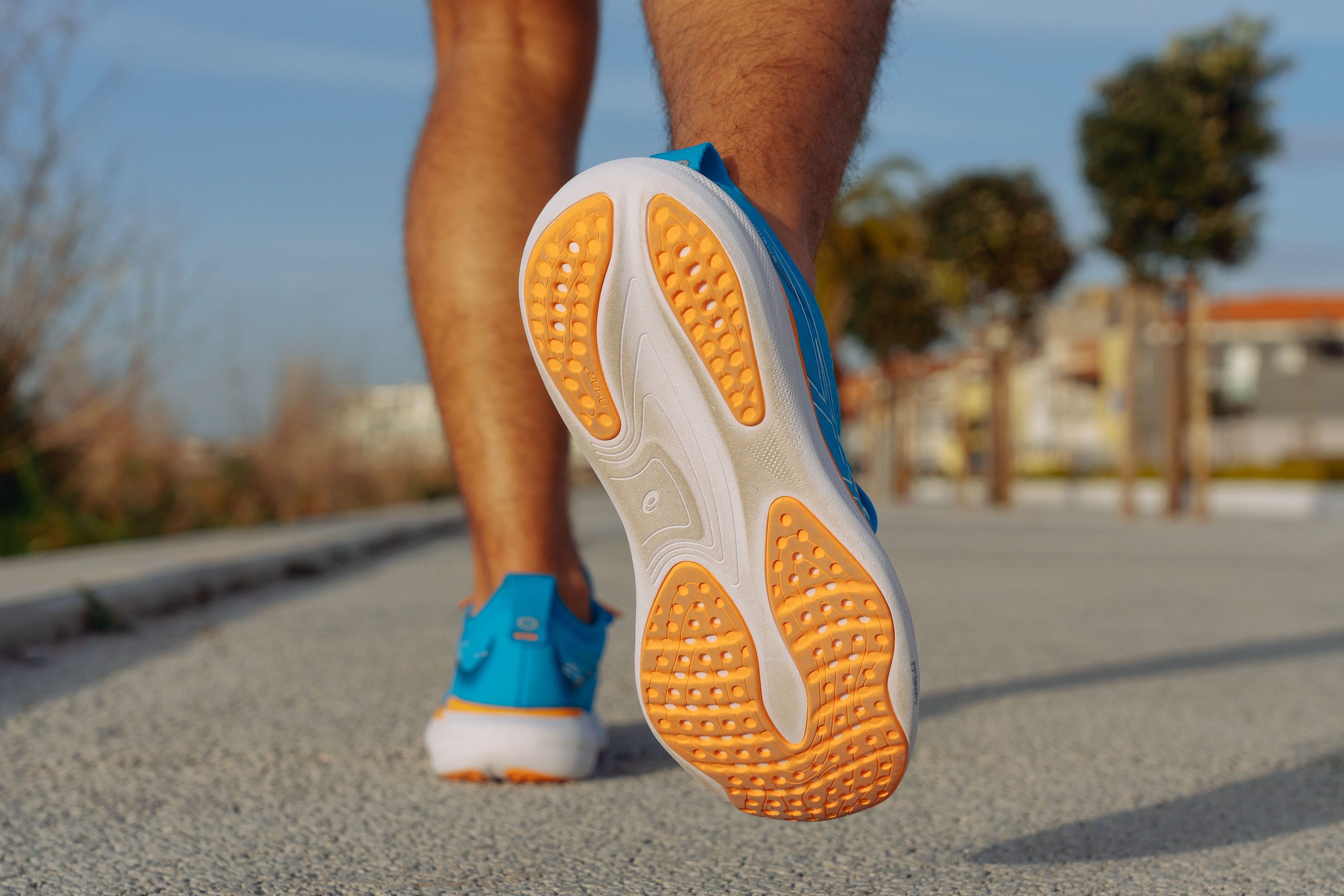
Flexibility / Stiffness
We secured the Nimbus 25 and used our machine to measure the amount of force needed to torque the shoe 30 degrees. With a result of 13.2N, the Gel Nimbus 25 is a bit more flexible than our current lab average.
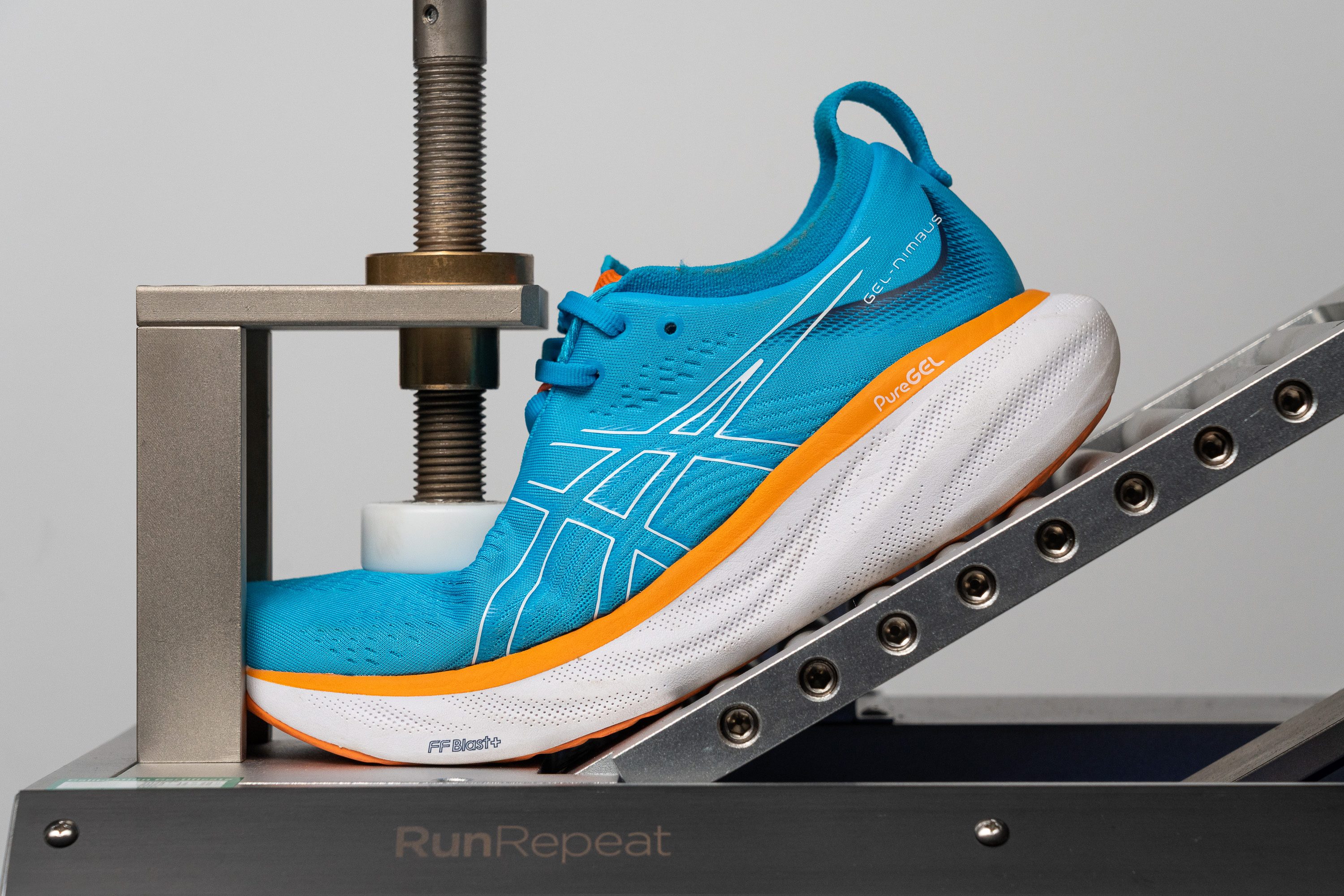
| Gel Nimbus 25 | 13.2N |
| Average | 15.3N |
Weight
Despite skimping on outsole rubber as our previous sections demonstrates, the Gel Nimbus 25 still weighs in at a heavier than average 10.2 Oz (289g). This isn’t devastatingly heavy though, and the shoe’s fluffy ride does help make it feel lighter than the scale suggests.
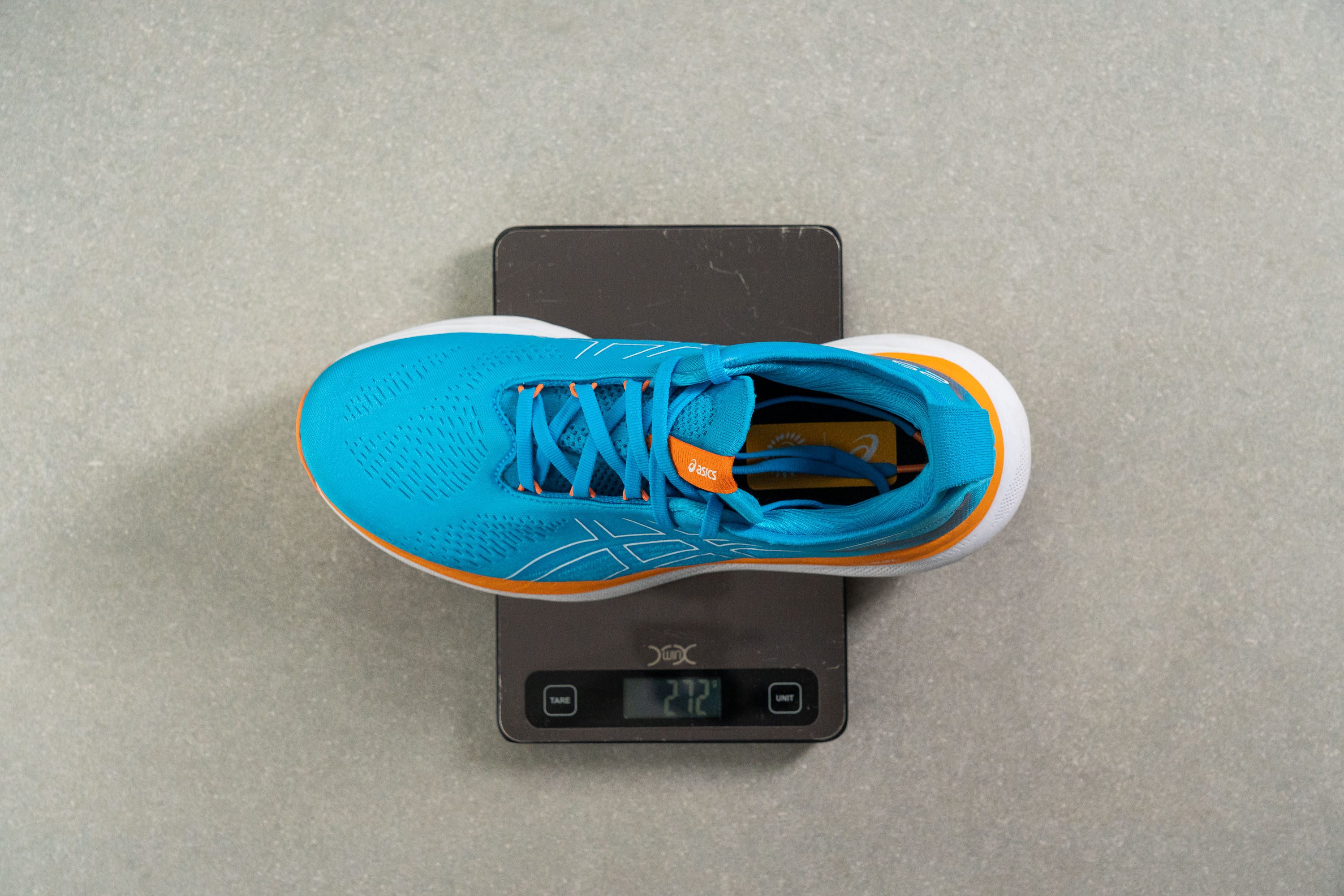
For a shoe that boasts a similarly large stack yet manages to be surprisingly lightweight, check out the lean, mean, running machine that is the Hoka Rocket X 2.
| Gel Nimbus 25 | 10.2 oz (289g) |
| Average | 9.3 oz (264g) |
Breathability
We pumped the Gel Nimbus 25 full of smoke to get a visual idea of how well-ventilated the shoe is. The upper looks airy thanks to all those perforations throughout the shoe, but the test clearly demonstrates that the tongue lets out the majority of the smoke while the rest of the shoe slowly chugs out a thin haze. This lackluster performance indicates poor medial airflow, with the tongue providing the redemption needed to earn the Gel Nimbus 25 a middle-of-the-road breathability score of 3 out of 5; explaining why we felt like we were running in a pair of toasters during our test runs.
Examining a cross section of the upper over a light, we can see that it is only able to shine through the holes in the tongue while the rest of the upper material seemingly blocks it out entirely.
The shoe’s ample padding and multi-layered upper mesh are the clear culprits of the Gel Nimbus 25’s poor airflow. While these elements contribute to the shoe’s overall comfort, it does come at the cost of making the shoe a toasty training partner that we wouldn’t recommend for hot summer runs.
| Gel Nimbus 25 | 3 |
| Average | 3.7 |
Stability
Lateral stability test
We generally don’t expect much stability from shoes that sit on gargantuan stacks of plush foam like the Gel Nimbus 25. However, this shoe bucks the trend by feeling surprisingly well-planted as we shifted our weight from side to side.
As the following tests will demonstrate; the combination of the shoe’s wide base, rigid build and snug heel counter come together to make the shoe feel reassuringly stable underfoot for neutral runners as well as those with mildly pronating strides.
Torsional rigidity
We faced quite a fair amount of resistance when we bent and twisted the Gel Nimbus 25 in our hands, earning it a score of 4 out of 5 on our subjective scale for torsional rigidity. This isn’t unusual for a shoe with so much foam in the midsole, with the result being a midsole that resists the natural rolling and contortion of our foot during our stride.
This leaves us with a level and stable landing platform with the cushy midsole meaning we don’t have to sacrifice too much in terms of underfoot comfort.
| Gel Nimbus 25 | 4 |
| Average | 3.5 |
Heel counter stiffness
We found the heel counter to be moderately stiff, putting up only a mild amount of resistance to us manually pinching and squeezing at it. This leads us to give the shoe a subjective score of 3 out of 5 for heel counter stiffness. This level of rigidity in the heel counter allows it to snugly hold our foot in place without squeezing in on our Achilles too tightly, allowing for some natural lateral movements.
| Gel Nimbus 25 | 3 |
| Average | 2.9 |
Midsole width - forefoot
The biggest contributor to the Gel Nimbus 25’s stable ride is the fact that the midsole is girthy as well as tall. Measuring 119.4 mm at the forefoot according to our caliper, the shoe’s midsole is much wider than our current lab average. This hefty base made it feel like we were springing off massive clouds during our test runs, with no fear of being caught off balance and plummeting to the ground like Prometheus.
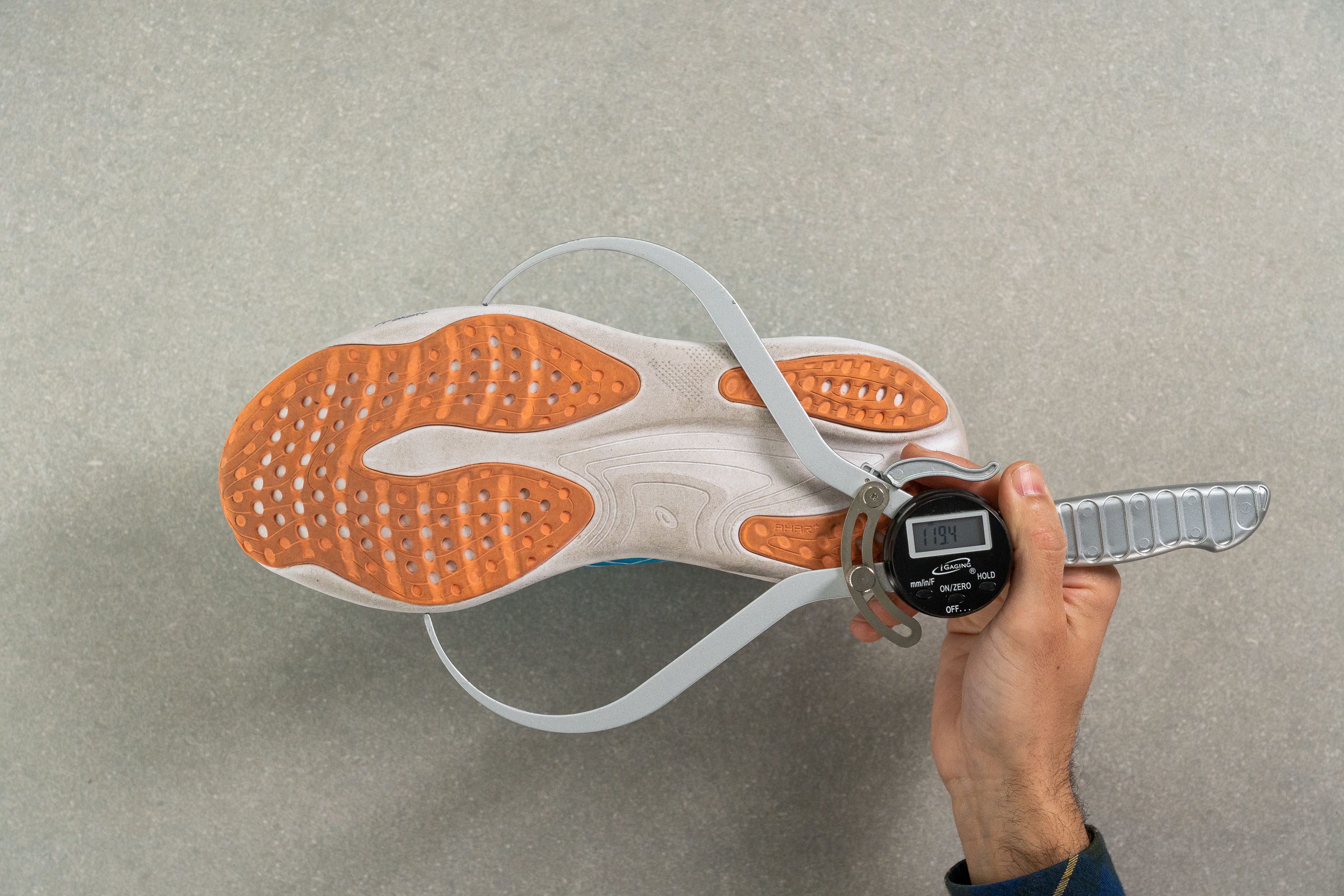
| Gel Nimbus 25 | 119.4 mm |
| Average | 114.4 mm |
Midsole width - heel
The shoe’s midsole is similarly substantial at the heel which measures 98.9 mm wide. This gives heel strikers much more of a landing platform than is afforded by the average road shoe aimed at neutral runners.
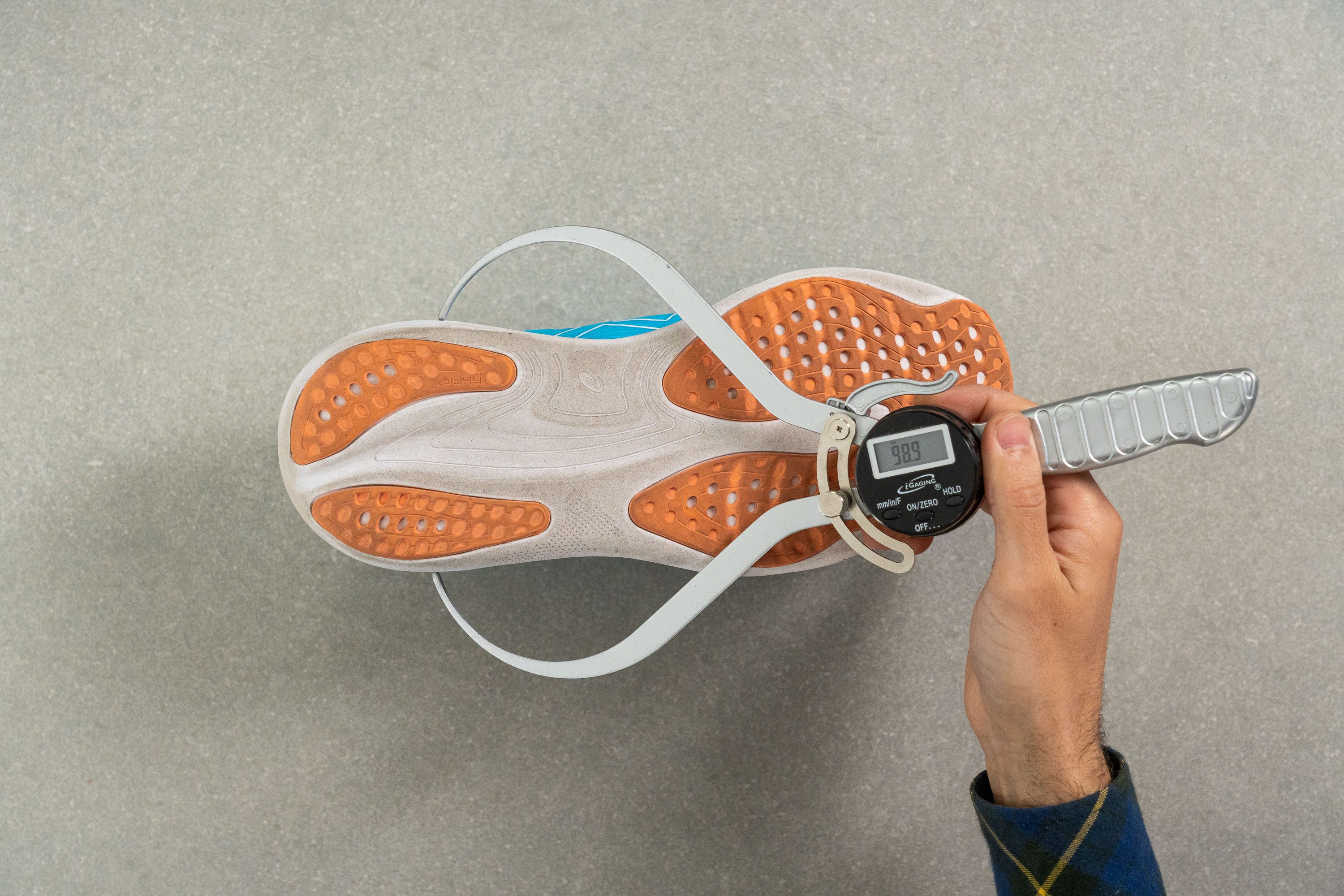
| Gel Nimbus 25 | 98.9 mm |
| Average | 90.6 mm |
Durability
Outsole hardness
We pressed our durometer against the Gel Nimbus 25’s AHARPLUS outsole to measure how hard the it is and got a marginally softer than average reading of 78.4 HC. In our examination of outsole materials in the lab so far, we’ve found that this level of hardness provides a healthy balance between hard and durable versus soft and grippy.
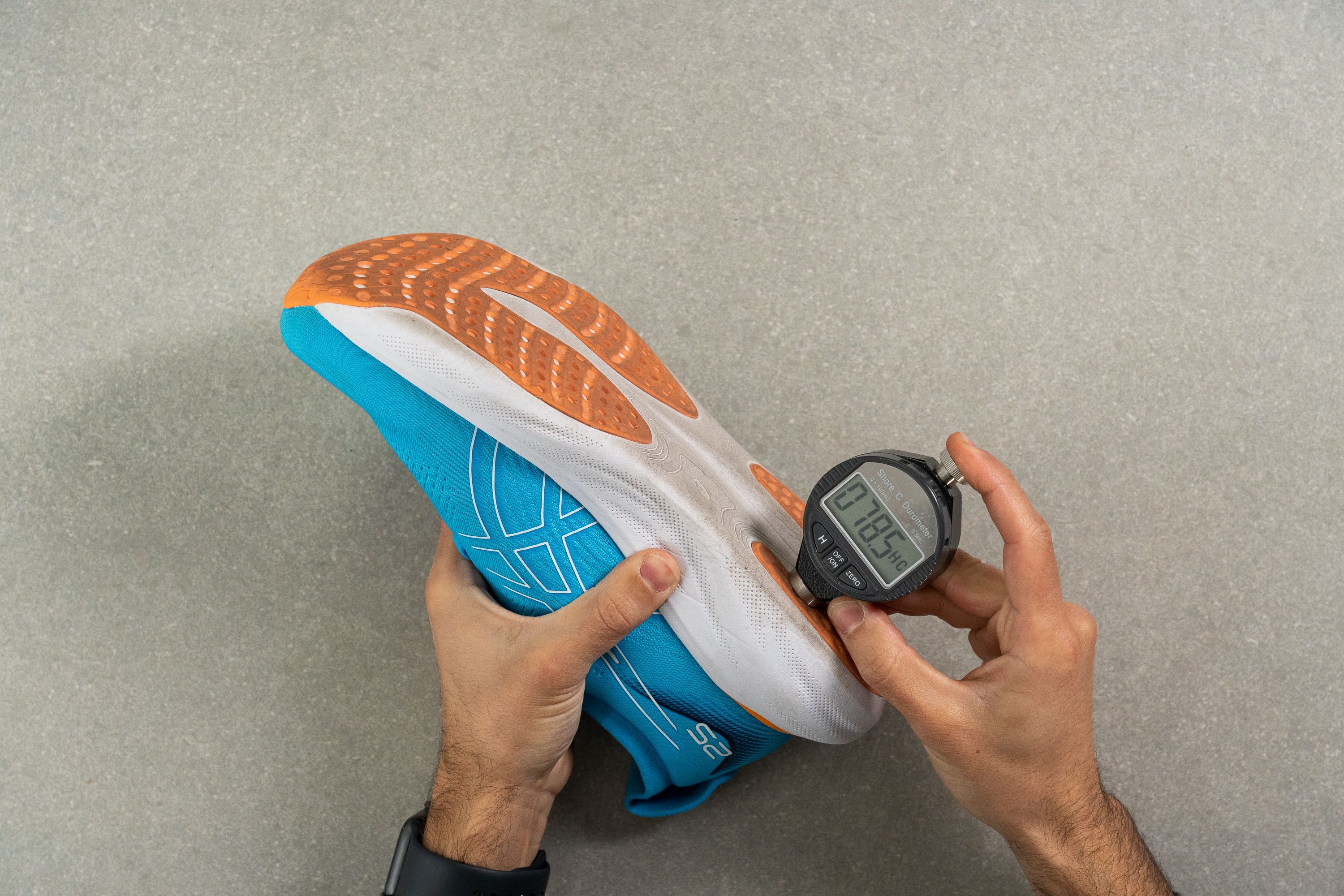
For an in-depth look at outsole compunds offered by different shoe brands, check out this article that explores the matter using data we've collected in the lab so far.
| Gel Nimbus 25 | 78.4 HC |
| Average | 79.2 HC |
Outsole thickness
Using our caliper, we measured the Gel Nimbus 25’s outsole to be 2.9 mm thick which isn’t as much rubber as the average road shoe tends to have underfoot. Minimizing the amount of rubber, both in terms of thickness and total coverage, is an effective weight-saving measure that helps keep the Gel Nimbus 25 feeling cloud-like rather than brickish underfoot.
On the other hand, this does give us less material to wear through and, given the somewhat soft rubber, means that we do expect to see some damage to the outsole after 400-miles of slapping asphalt.
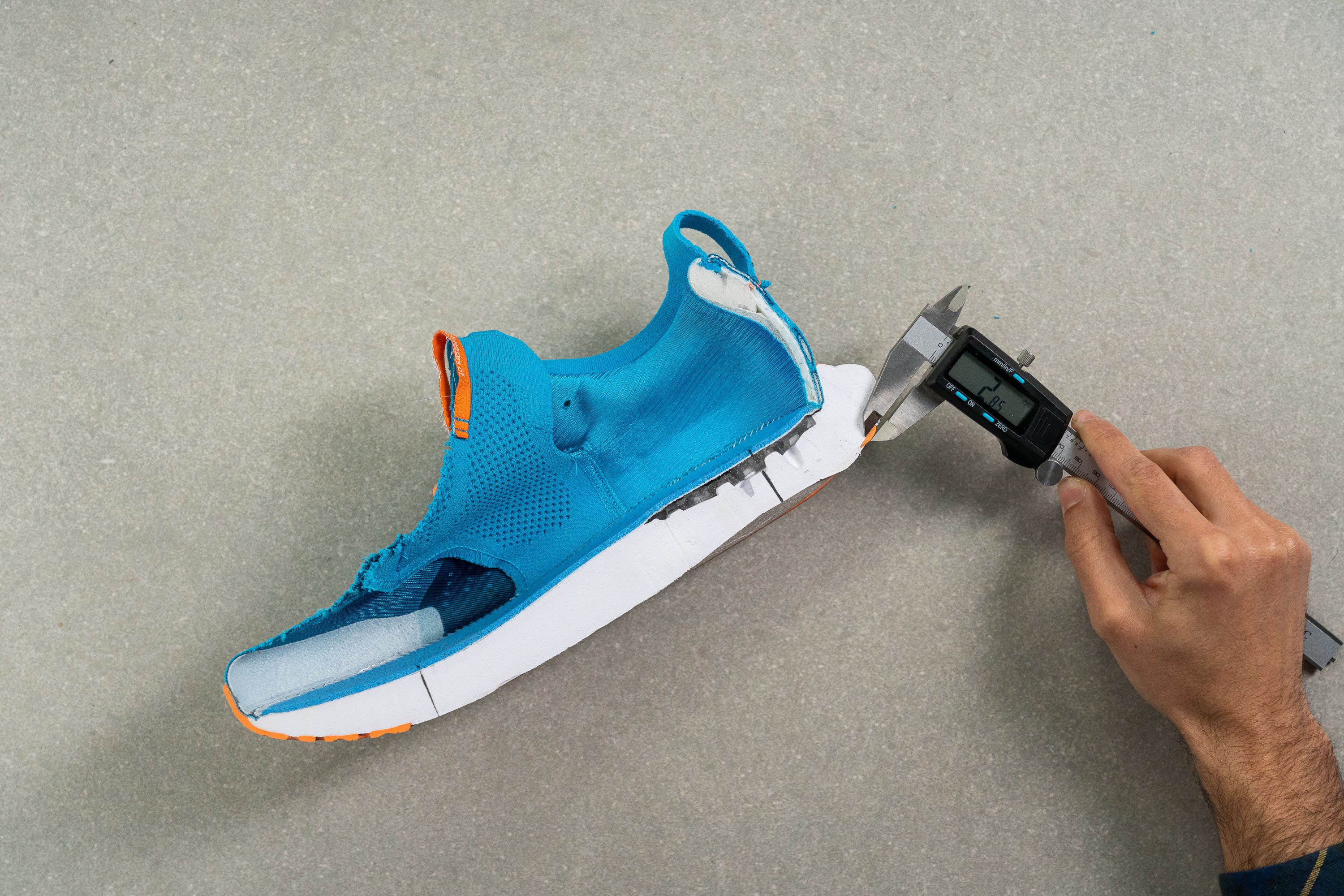
| Gel Nimbus 25 | 2.9 mm |
| Average | 3.2 mm |
Misc
Insole thickness
Even the shoe’s insole is thicker than average, measuring 5.5 mm according to our caliper measurements. This gives us an amply padded and soft surface within the shoe that further contributes to the Gel Nimbus 25’s cloud-like ride.
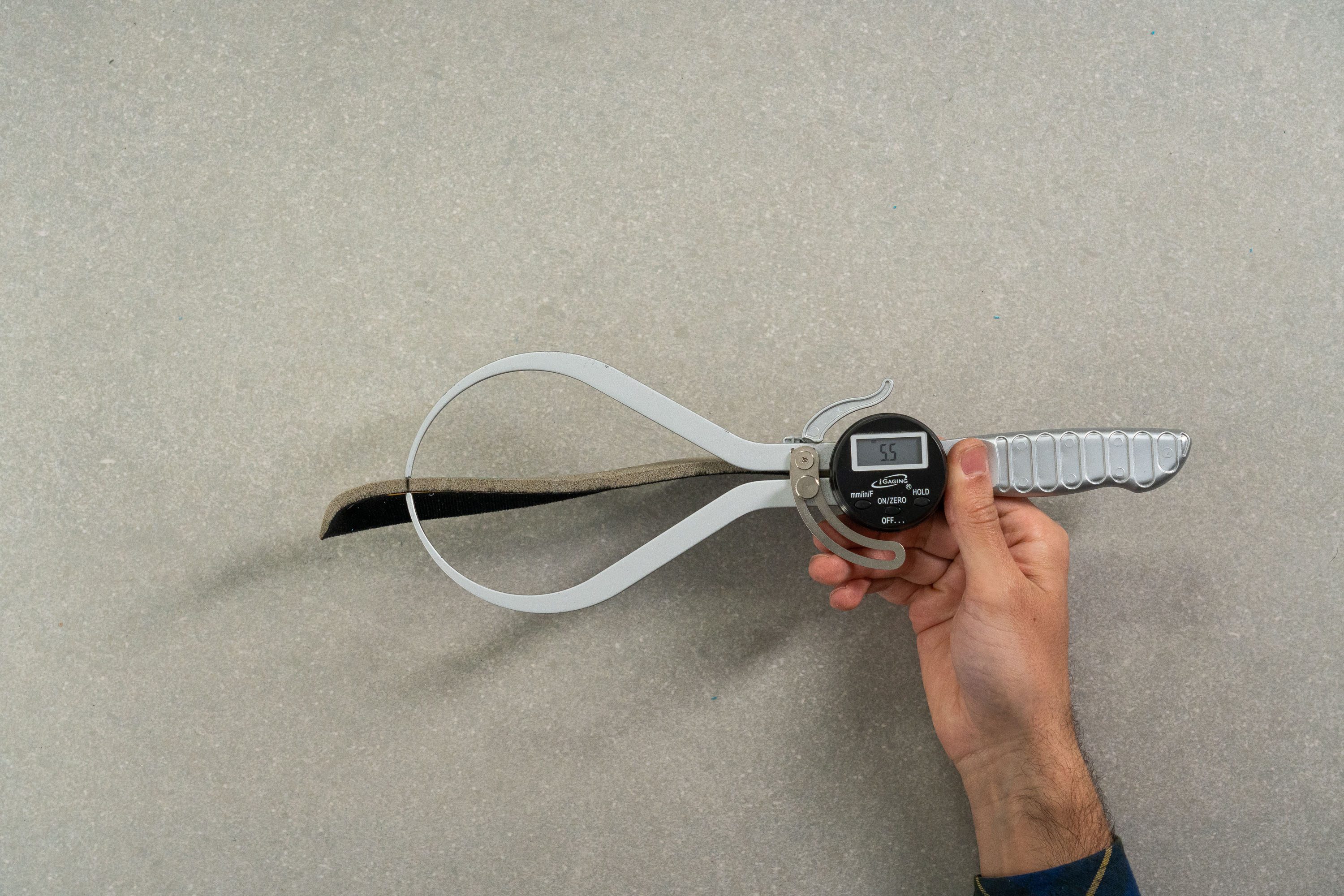
| Gel Nimbus 25 | 5.5 mm |
| Average | 4.5 mm |
Removable insole
The Gel Nimbus 25’s insole isn’t glued in, making replacing it with a custom orthotic possible where necessary.
| Gel Nimbus 25 | Yes |
Midsole softness in cold (%)
We placed the Gel Nimbus 25 in our freezer to observe the effect of cold conditions on the shoe’s midsole. After chilling for twenty minutes, we took another durometer reading of the midsole foam and got a post-freezer reading of 25.4 HA. While this is quite a bit stiffer than the room temperature result, it’s still soft enough to provide us with a balanced level of cushioning that will keep our feet feeling comfortable and cared for even through the most bitterly cold winter runs.
We expect midsole foams to harden in the cold, but becoming 36.3% more firm means that the Gel Nimbus 25 isn’t as consistent as the average road shoe under similar conditions. This means that the difference in the shoe’s ride will be quite apparent for runners living in colder climates.
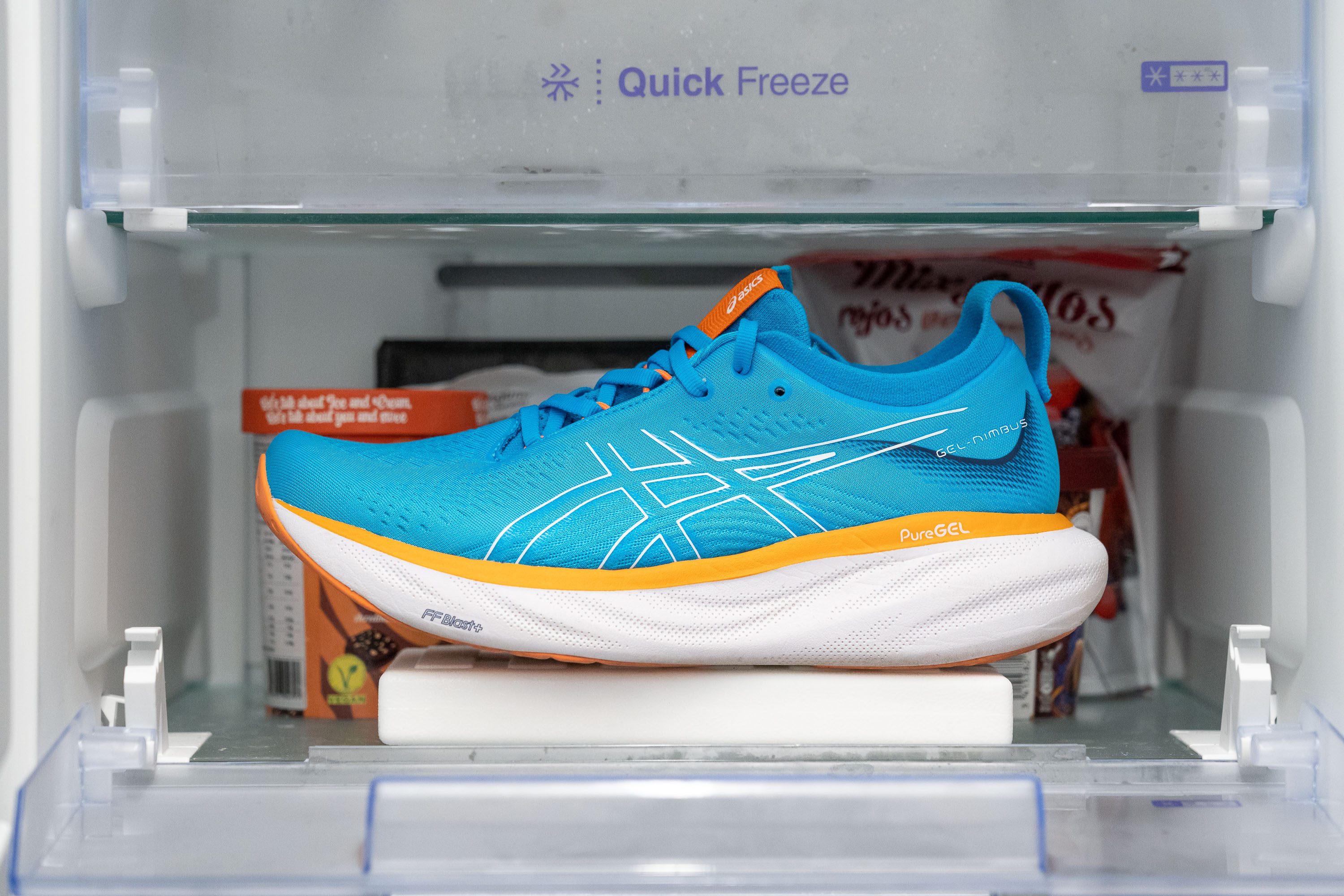
| Gel Nimbus 25 | 36% |
| Average | 24% |
Reflective elements
Clouds aren’t that visible at night, and neither is the Gel Nimbus 25. With only a small reflective element emblazoning the finger loop of each shoe, we recommend sticking to well-lit routes if running at night without additional high-vis gear.
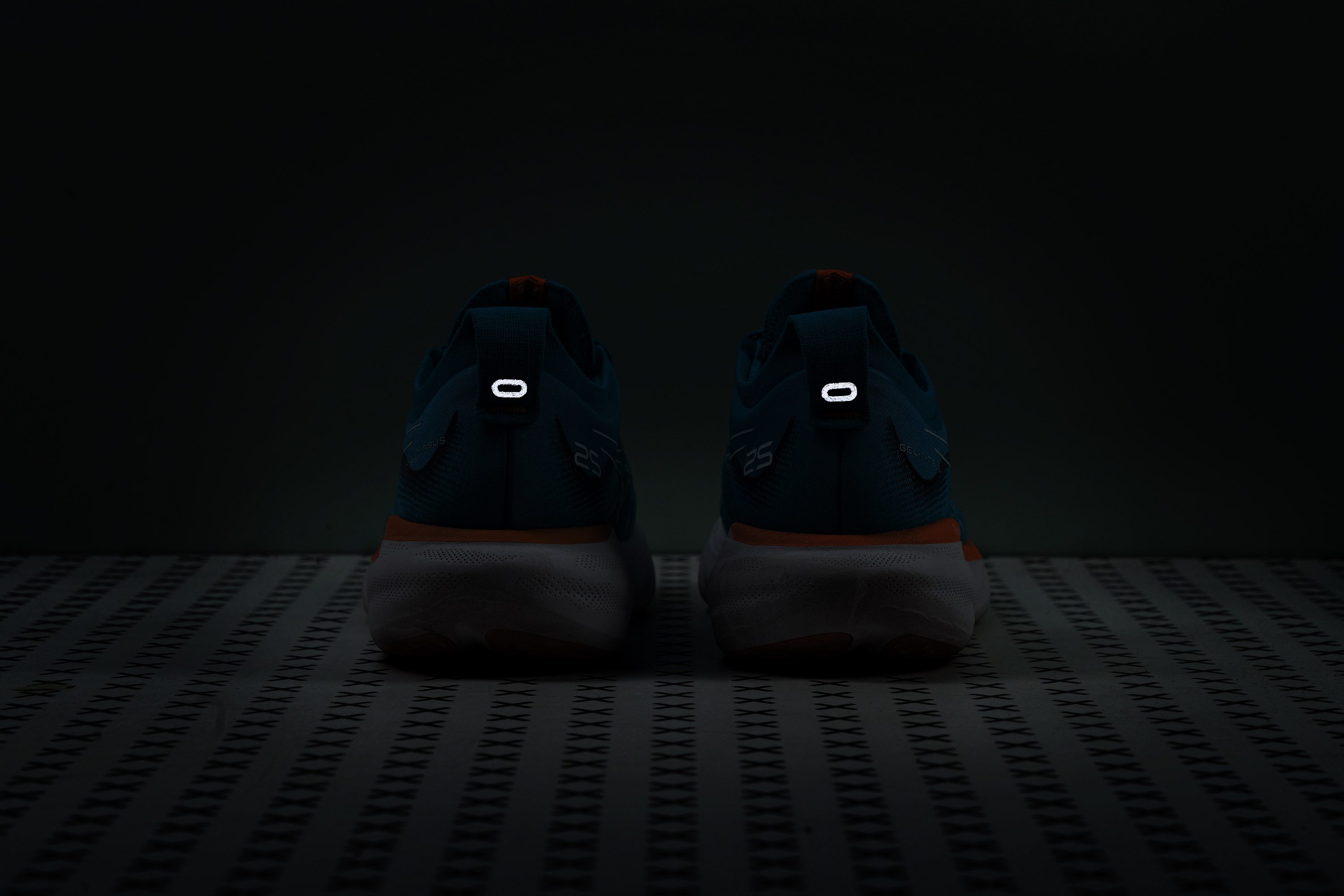
| Gel Nimbus 25 | Yes |
Tongue padding
Further contributing to the Gel Nimbus 25’s performance-shoe-feel is its paper-thin tongue, which we measured to be a mere 1.9 mm thick. This is barely any padding compared to the average road shoe, let alone daily trainers, and means that the laces did feel quite apparent over our instep, especially during our longer test runs.
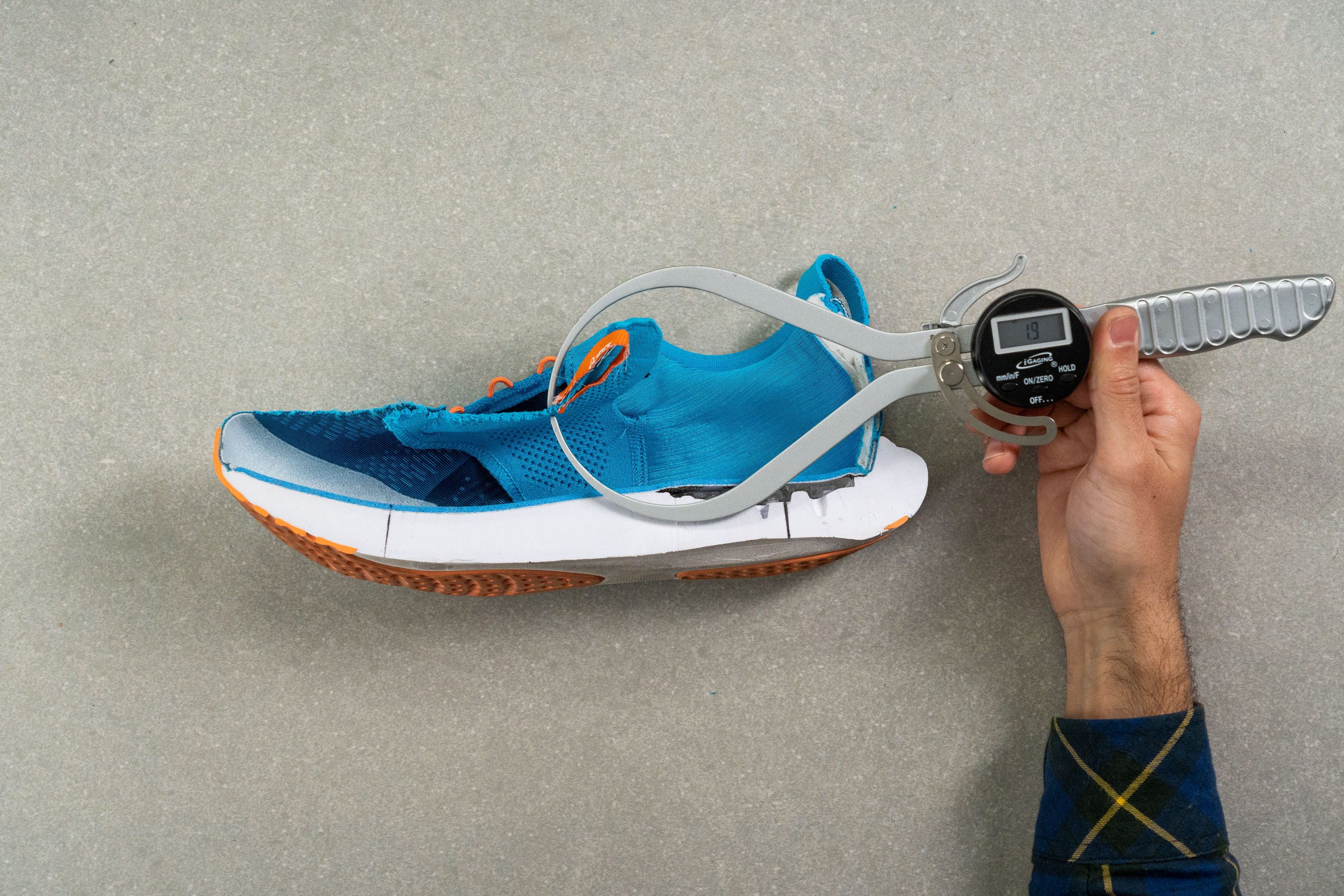
While we would have appreciated a little more padding to avoid that annoying lace bite, ASICS does manage to effectively keep some weight off of what is already a heavier than average road shoe. Difficult trade-offs just have to be made sometimes.
| Gel Nimbus 25 | 1.9 mm |
| Average | 5.7 mm |
Tongue: gusset type
The Gel Nimbus 25’s tongue is semi-gusseted, with the gusset running down the top half of the tongue. This gave us a solid locked in sensation once laced up, and helped to prevent the tongue from slipping during our test runs.
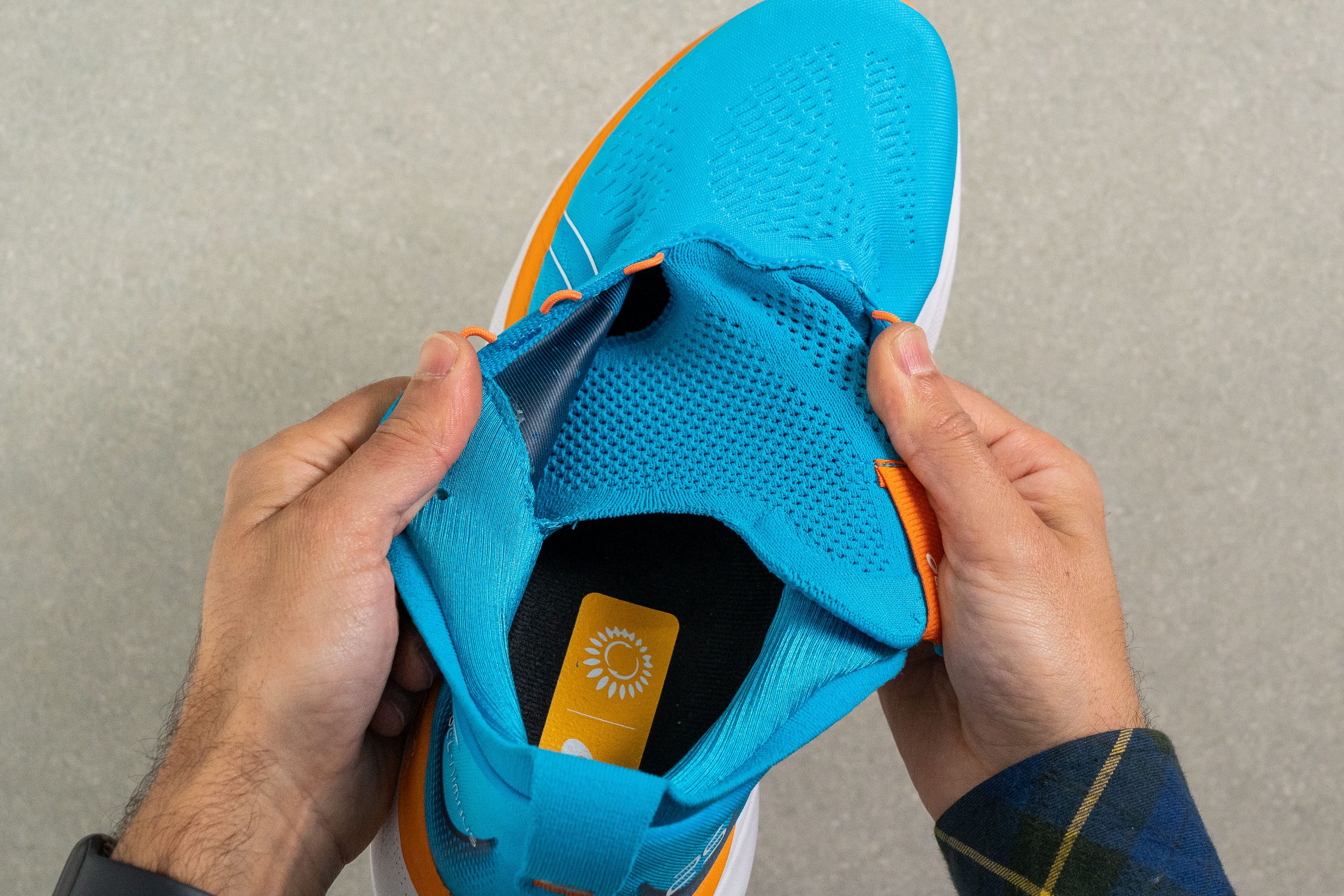
| Gel Nimbus 25 | Both sides (semi) |
Heel tab
The Gel Nimbus 25 features an elegant finger loop at the heel that isn’t just practical in helping us slide the shoe on and off, but looks dang cool too!
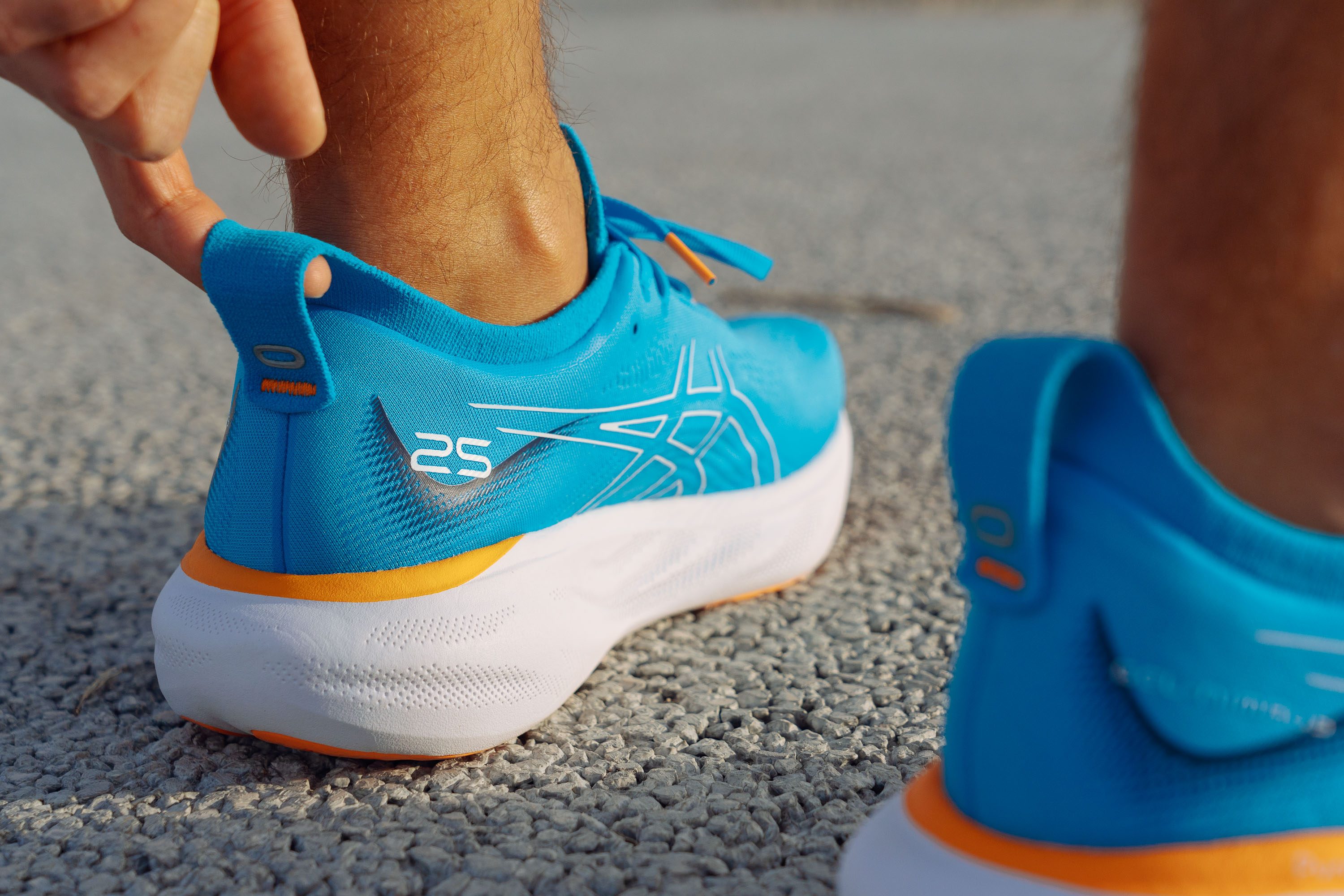
| Gel Nimbus 25 | Finger loop |

